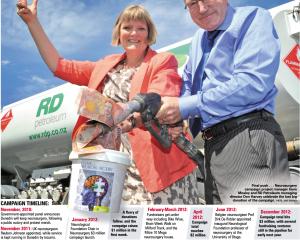Because Dunedin had a smaller population than Christchurch, it would always have fewer neurosurgery cases.
Therefore, it made sense to partner with the University of Otago to form the academic unit, which would draw on the resources of the Wellington and Christchurch campuses.
Research into tumours was already established in Dunedin, which would be greatly strengthened by hiring a professor of neurosurgery and developing a staffed unit.
The type of research carried out partly depended on the interests of the professor, who is being recruited.
Nearly all neurosurgeons had an interest in research and, as the country's only research centre of neurosurgery, Dunedin would occupy a special place in the South Island service, as its academic heart.
The Dunedin neurosurgery hub was part of the South Island service, so the wider region benefited from establishing the Neurological Foundation Chair in Neurosurgery.
As the Dunedin hub became established, clinical work from Christchurch and further afield would be sent south. The types of surgery carried out in Dunedin and Christchurch would become clearer as the South Island service developed, with the sites having their own specialties.
A key area for Dunedin sub-specialisation was radiosurgery.
At present, Dunedin was the only New Zealand site delivering that service, Mr MacFarlane said.
The Ministry of Health is reviewing radiosurgery because of increasing demand, and Mr MacFarlane, who is on the review committee, hoped the outcome would see a heavier caseload for Dunedin.
"[Dunedin radiosurgery is] a well-established unit. It has a worldwide reputation and an expertise that puts it way ahead."
The outcome of the review was uncertain, although Dunedin would definitely retain the service.
Radiosurgery involves intense beams of radiation directed at hard-to-reach tumours.
It was likely that coiling, which involved inserting tiny coils to treat aneurysms, would remain solely in Christchurch, where it was well established.
Mr MacFarlane, who once lobbied for all South Island neurosurgery to be Christchurch-based, said the Canterbury earthquakes changed his perception.
Duplicating highly resourced clinical units was expensive, but it was important to have different sites of treatment in the event of access difficulties.
Mr MacFarlane said the Dunedin hub was functioning well.
Resident neurosurgeon Ahmad Taha was supported by a locum, and neurosurgeons from the Christchurch hub, as well as Wellington.
Neurosurgery was a misunderstood specialty. People wrongly assumed head injuries accounted for most of the work.
In fact, no more than 5% of the work dealt with serious head trauma. haemorrhages, aneurysms, tumours and spinal conditions accounted for much bigger proportions, Mr MacFarlane said
What is neurosurgery?
• Involves the operative and non-operative treatment of diseases and conditions of the nervous system - the brain, cranial nerves, pituitary gland, spinal cord, peripheral nerves and the coverings of all these structures.


